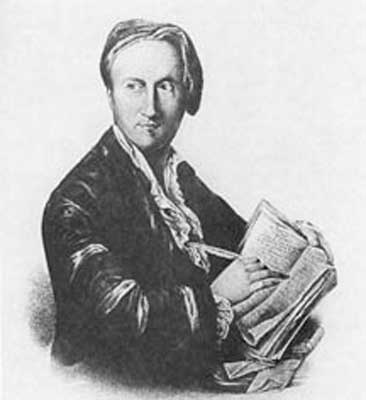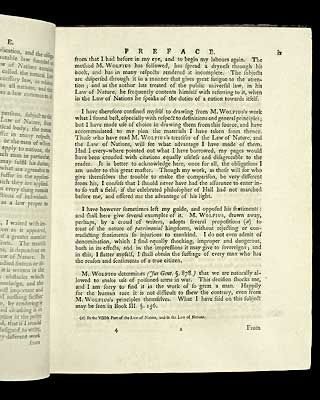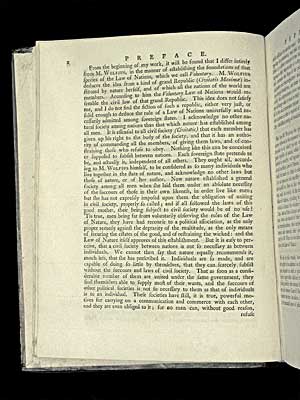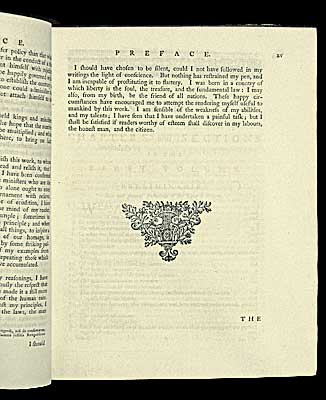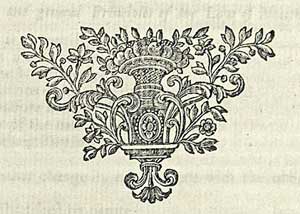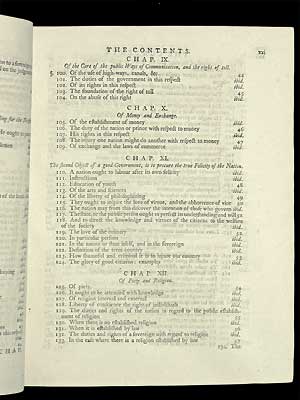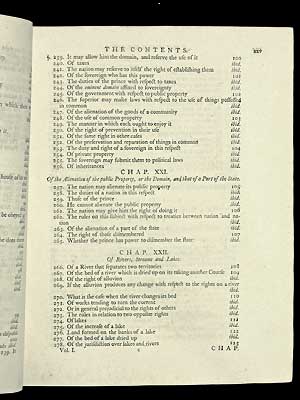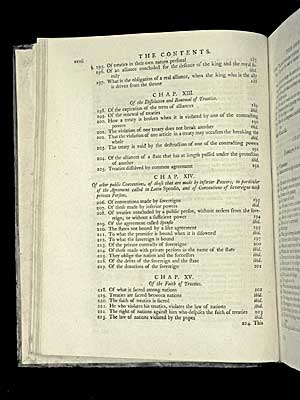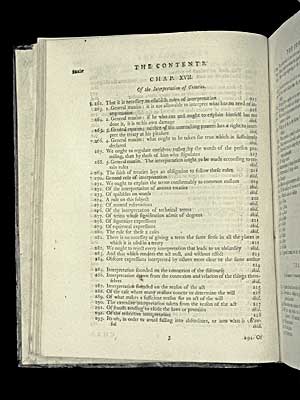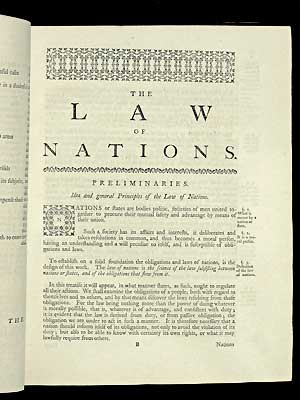Emerich de Vattel (1714–67)
Swiss philosopher and jurist
Droit des gens; ou, Principes de la loi naturelle appliquTs a la conduite et aux affaires des nations et des souverains (1758)
Law of Nations, 1759 First English Edition
The first English edition of Law of Nations; or Principles of the Law of Nature: Applied to the Conduct and Affairs of Nations and Sovereigns is shown below. The title page is followed by the Preface and then the Table of Contents for Book I and Book II is shown in its entirety. The handwriting on the title page is from a previous owner.
Law of Nations was strongly influenced by Leibnitz and Christian von Wolff. Vattel rejects the social contracts of Hobbes and Locke to propose a system of mutual law and respect for the betterment of all mankind. Where Hobbes had proposed a hierarchical system based on his mistrust of man's nature and of the populace in general, Vattel sees our only hope in redirecting selfishness to the common good.
Quotations:It is easy to conceive what exalted felicity the world would enjoy, were all men willing to observe the rule that we have just laid down. On the contrary, if each man wholly and immediately directs all his thoughts to his own interest, if he does nothing for the sake of other men, the whole human race together will be immersed in the deepest wretchedness. Let us therefore endeavor to promote the general happiness of mankind: all mankind, in return, will endeavor to promote ours, and thus we shall establish our felicity on the most solid foundations. (Preliminaries, Section X)
The end of the natural society established among men in general is that they should mutually assist one another to advance their own perfection and that of their condition; and Nations, too, since they may be regarded as so many free persons living together in a state of nature, are bound mutually to advance this human society. Hence the end of the great society established by nature among all nations is likewise that of mutual assistance in order to perfect themselves and their condition. (Preliminaries, Section XVII)
A dwarf is as much a man as a giant; a small republic is not less a sovereign state than the most powerful kingdom. (Preliminaries, Section XVIII)
All nations are therefore under a strict obligation to cultivate justice towards each other, to observe it scrupulously, and carefully to abstain from every thing that may violate it. Each ought to render to the others what belongs to them, to respect their rights, and to leave them in the peaceable enjoyment of them. (Book II, Chapter V)
PEACE is the reverse of war: it is that desirable state in which every one quietly enjoys his rights, or, if controverted, amicably discusses them by force of argument. Hobbes has had the boldness to assert, that war is the natural state of man. But if, by "the natural state of man," we understand (as reason requires that we should) that state to which he is destined and called by his nature, peace should rather be termed his natural state. (Book IV, Chapter II, Section I)
Further Resources:
The text of The Law of Nations -- 1753; 1883 Chitty translation put into HTML by Jon Roland of the Constitution Society.
Paper on the influence Vattel had on the form of the American Constitution and form of government. The article will give you a good grounding in the issues involved and the multiple directions of influence on the founding fathers. Life, Liberty, and The Pursuit of Happiness: How the Natural Law Concept of Gottfried Wilhelm Leibniz Inspired America's Founding Fathers -- by Robert Trout, which appeared in FIDELIO Magazine, Vol . VI No.1 , Spring, 1997
The text of Droit des gens; ou, Principes de la loi naturelle appliquTs a la conduite et aux affaires des nations et des souverains -- 1753 in the original French. May download a facsimile edition in PDF format. from THE ONLINE LIBRARY OF LIBERTYPaper on Leibniz' On Natural Law. Pay particular attention to Section 5 "Leibniz against Descartes and Hobbes." From Hideaki Hirano.
Introduction to Christian von Wolff, the philosopher whose ideas serve as the basis of Vattel's work.
Discussion and summary of Law of Nations, with a link to a discussion of Vattel's Natural Law from Tripod, bad pop-ups but a good summary.
Brief biographical sketch of Vattel from Penn Law.
(c) Marilyn Shea, 2006
